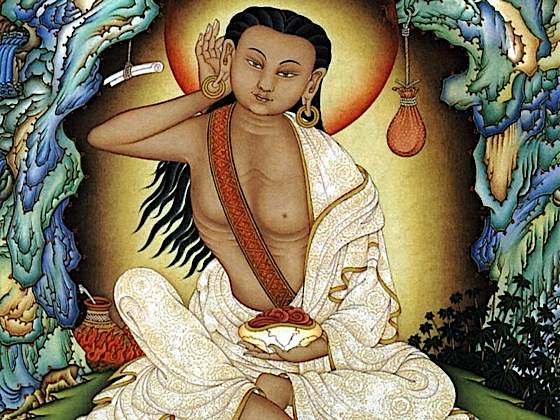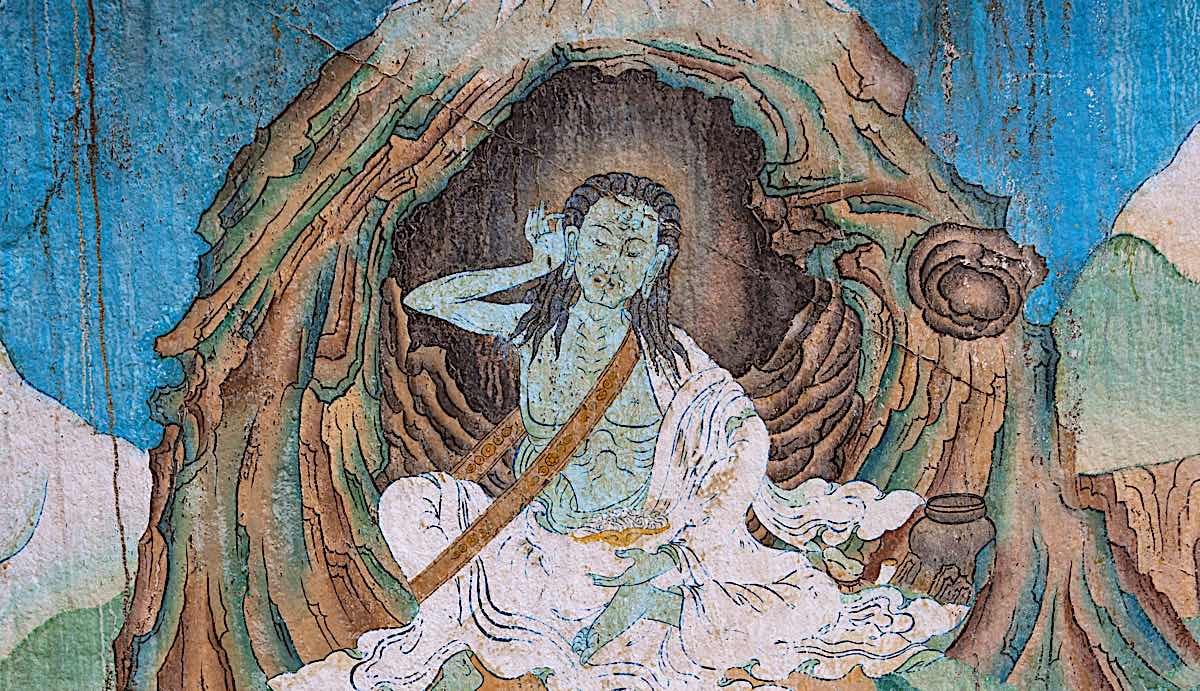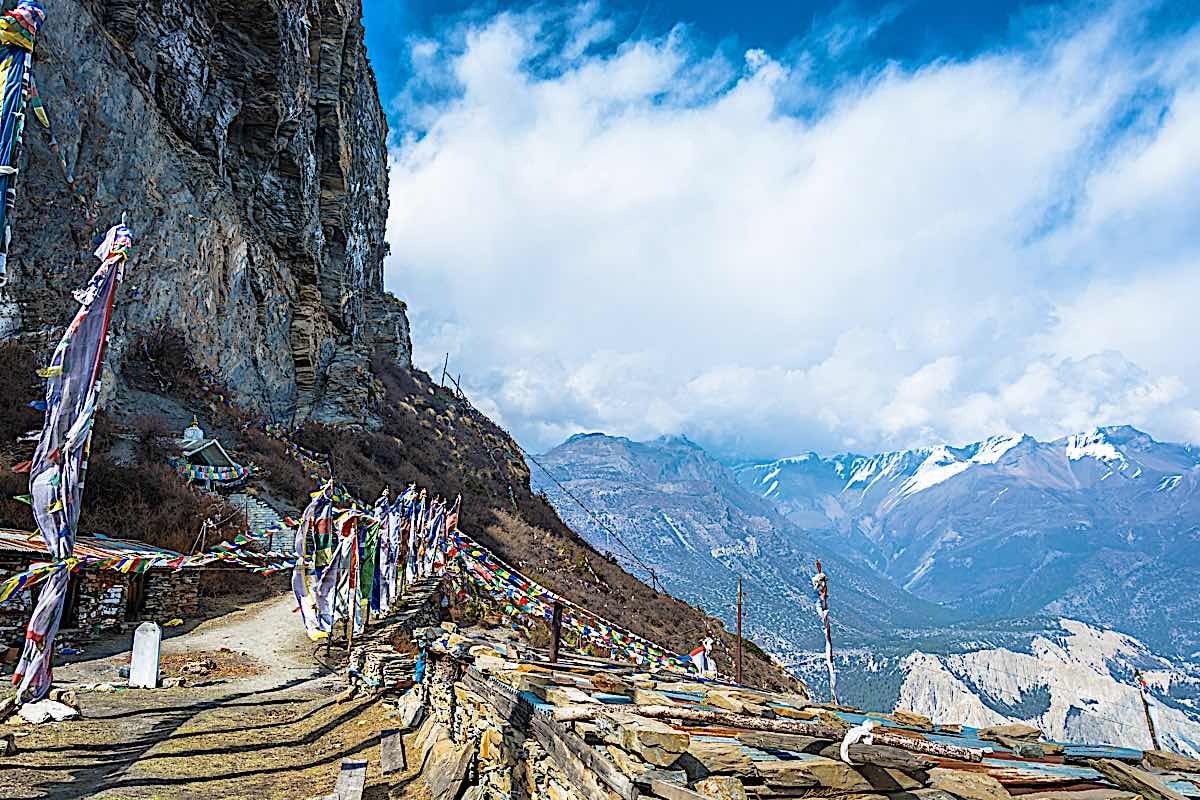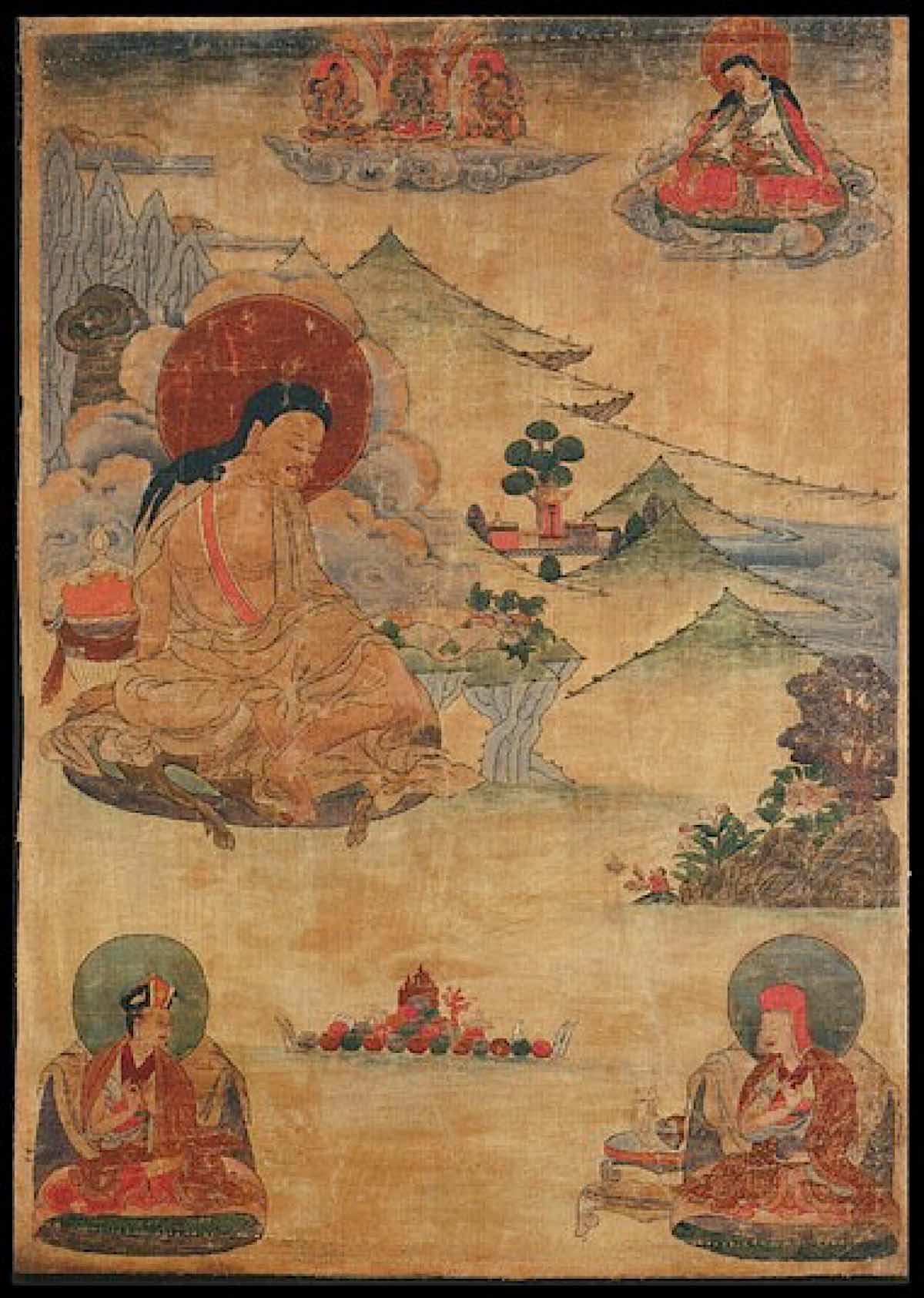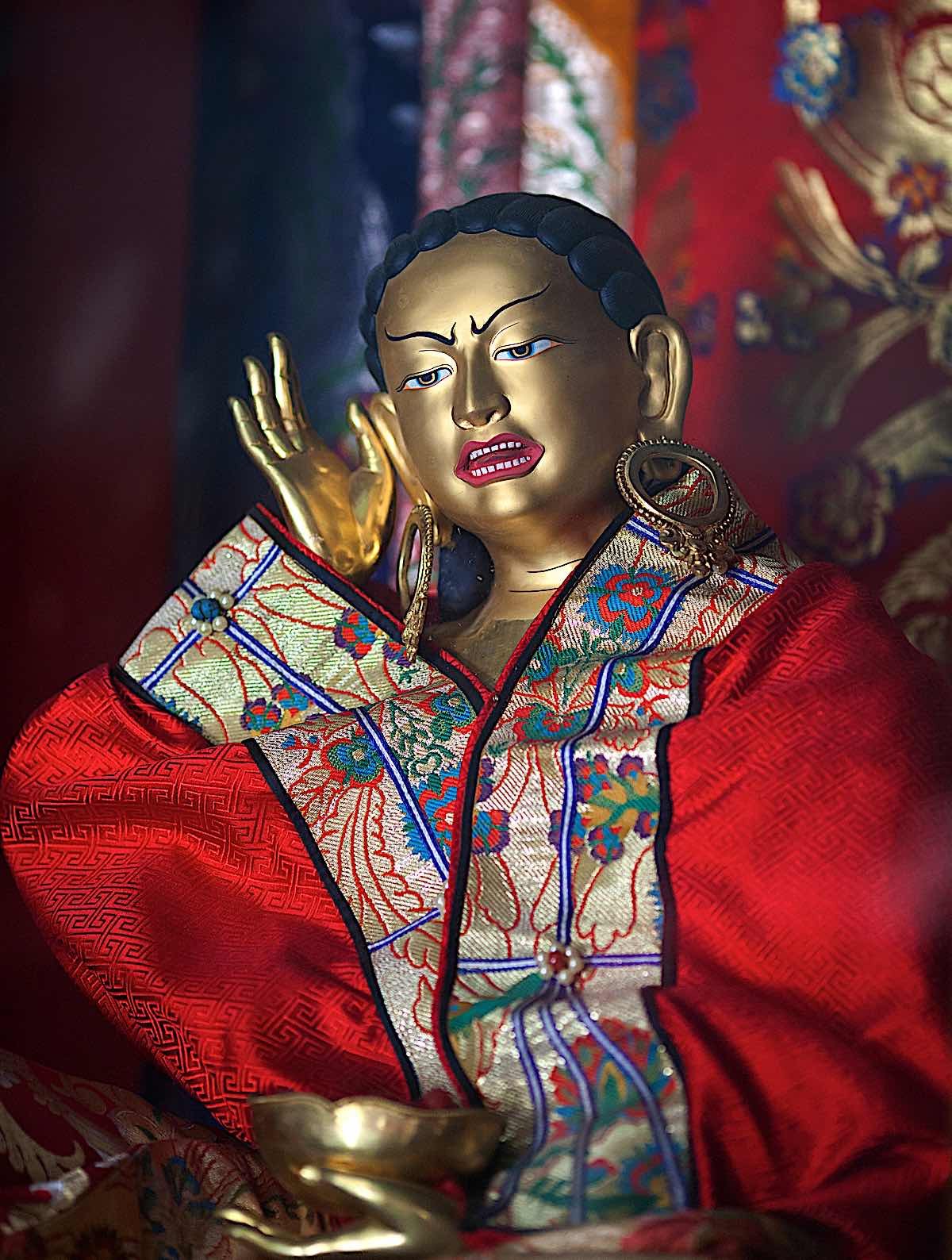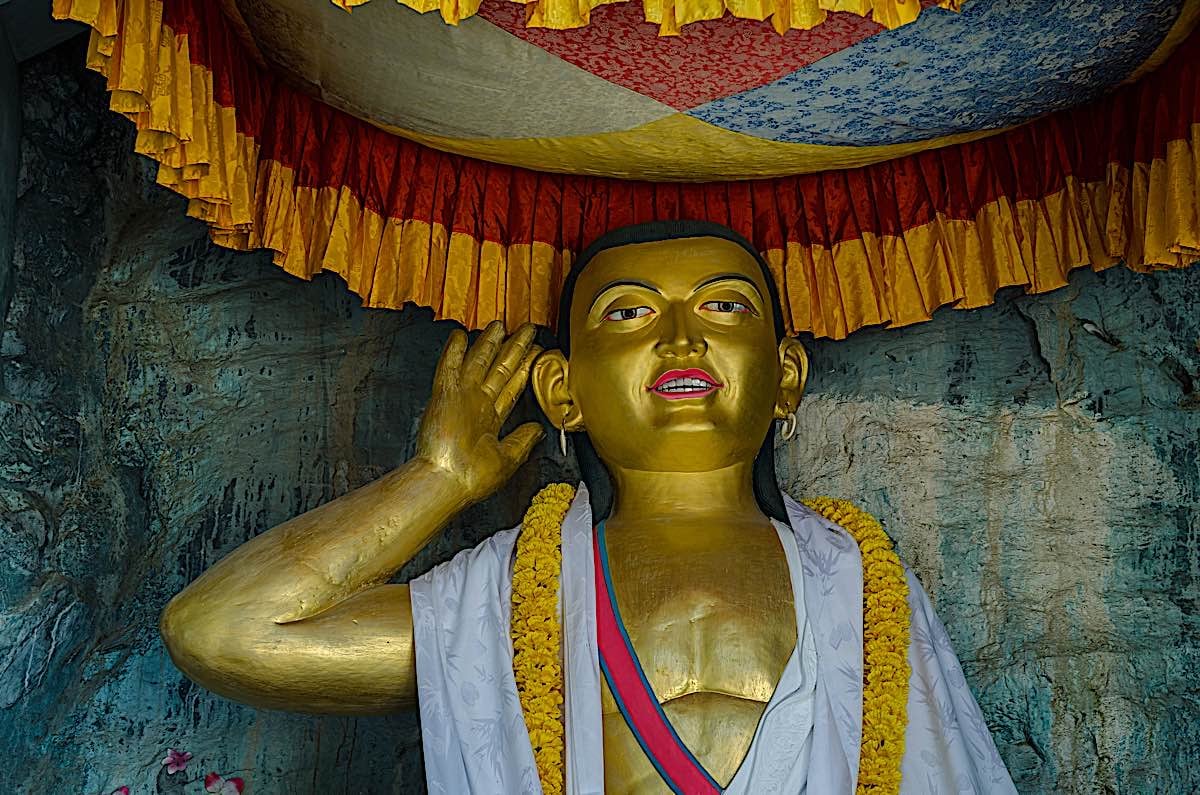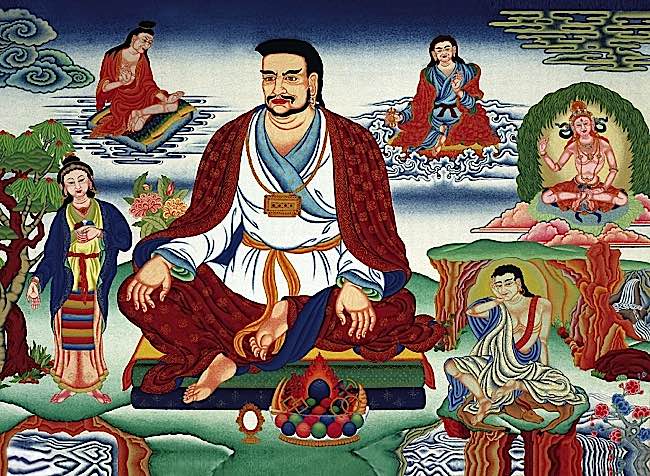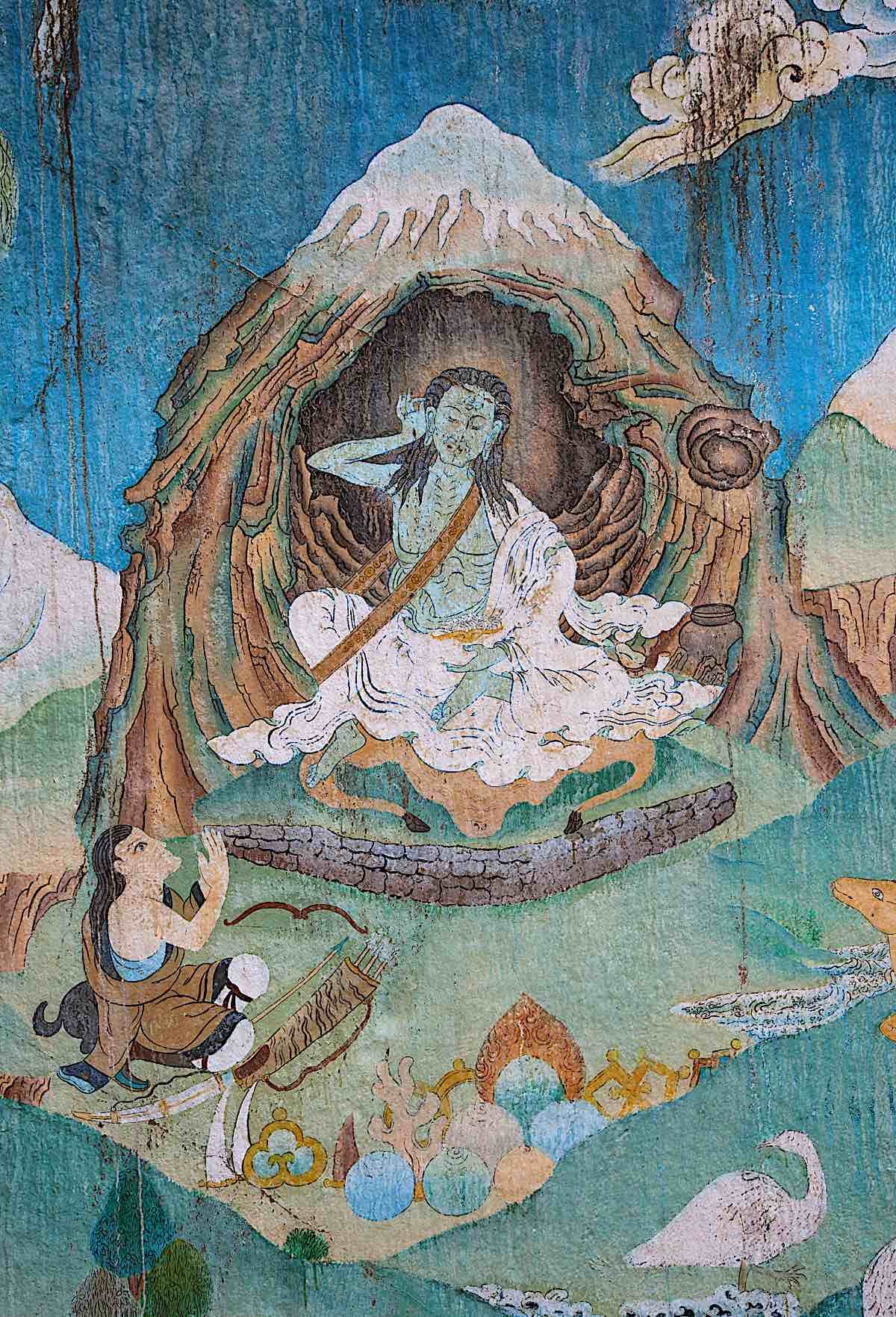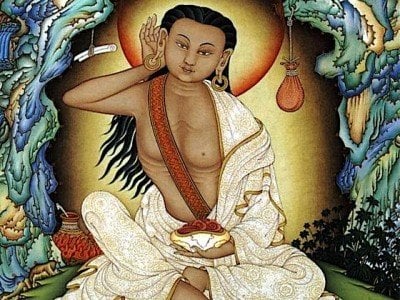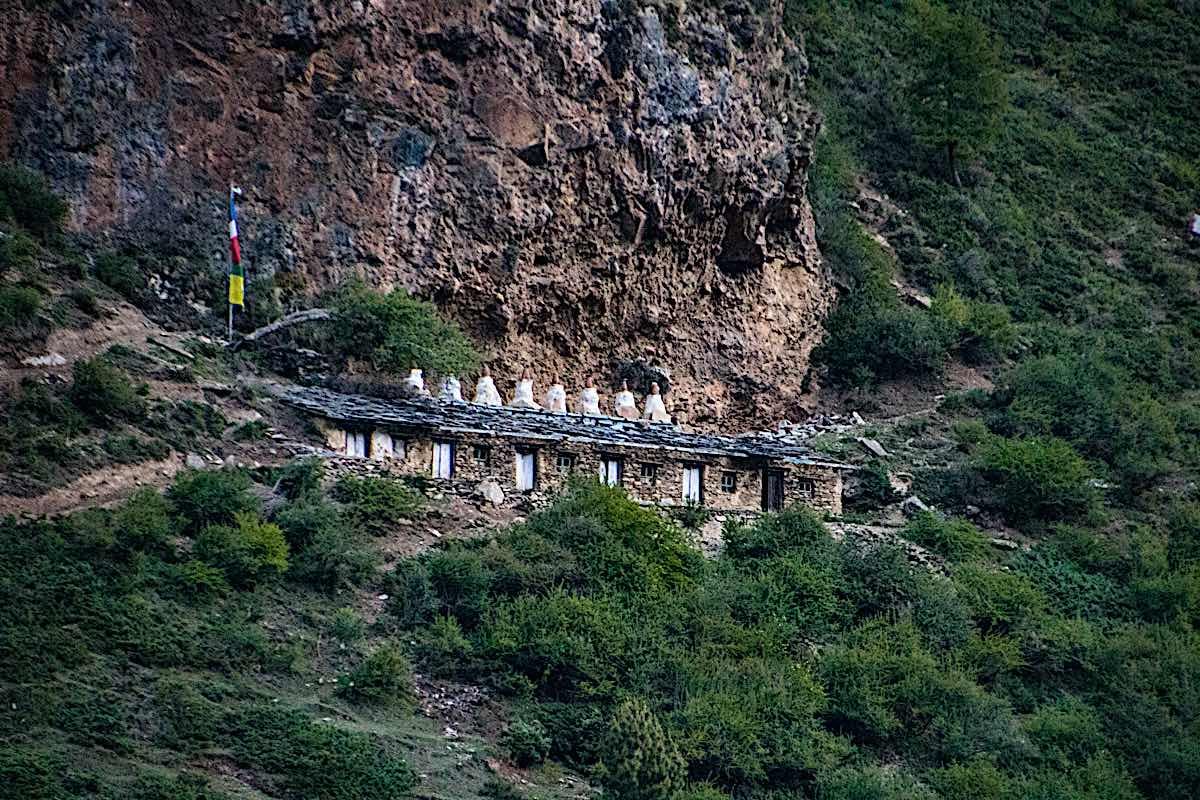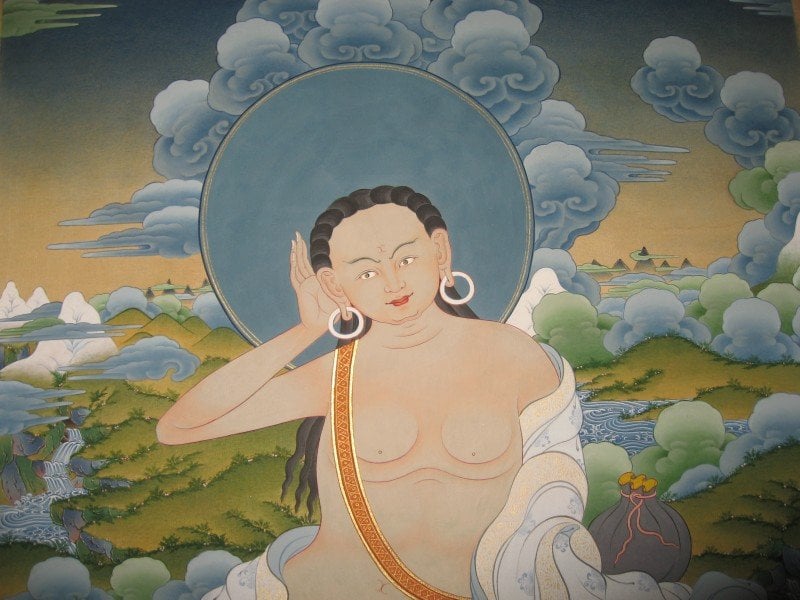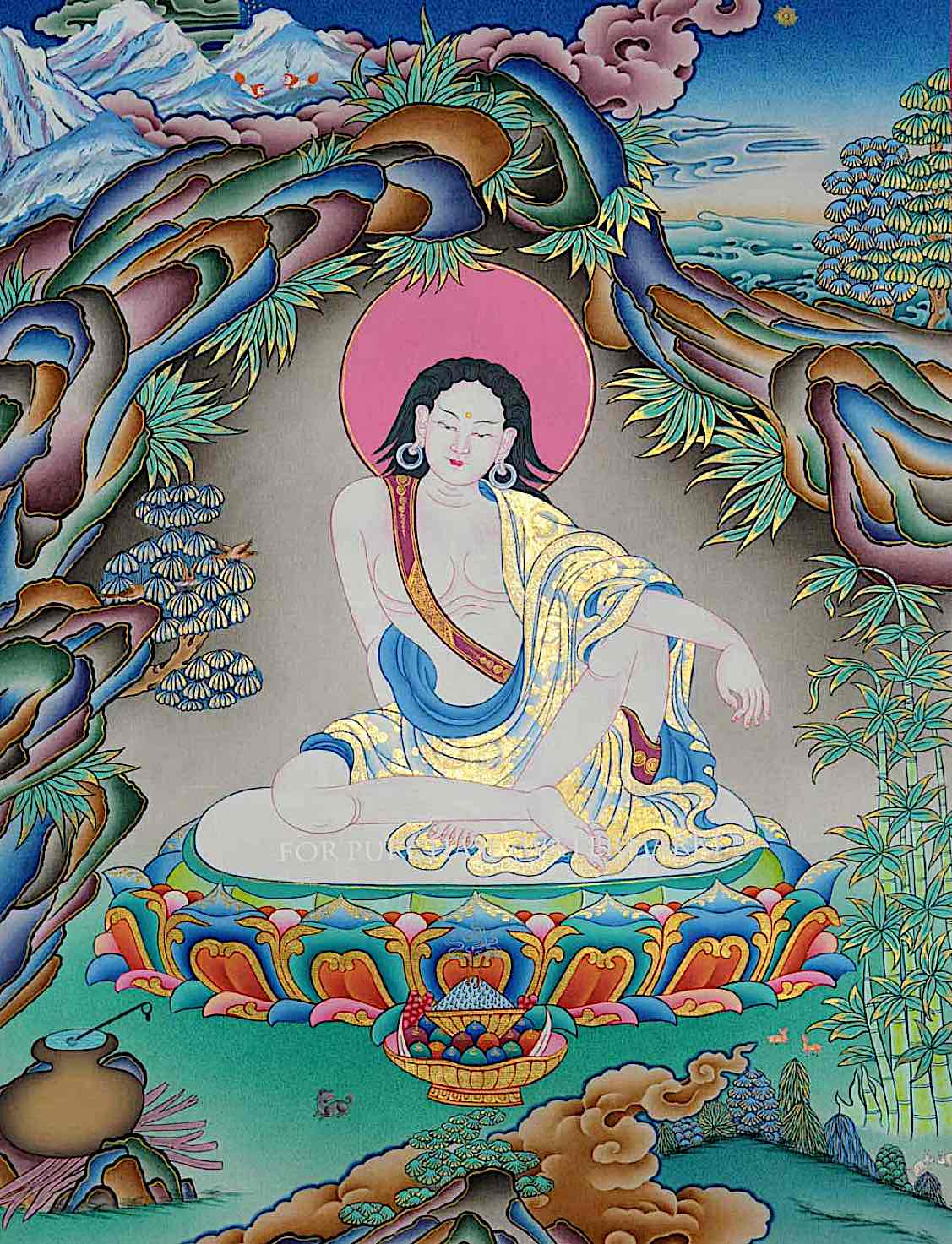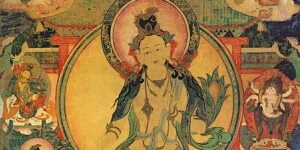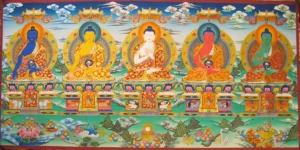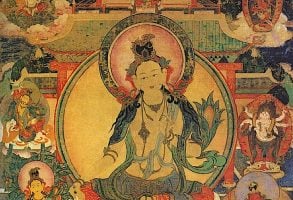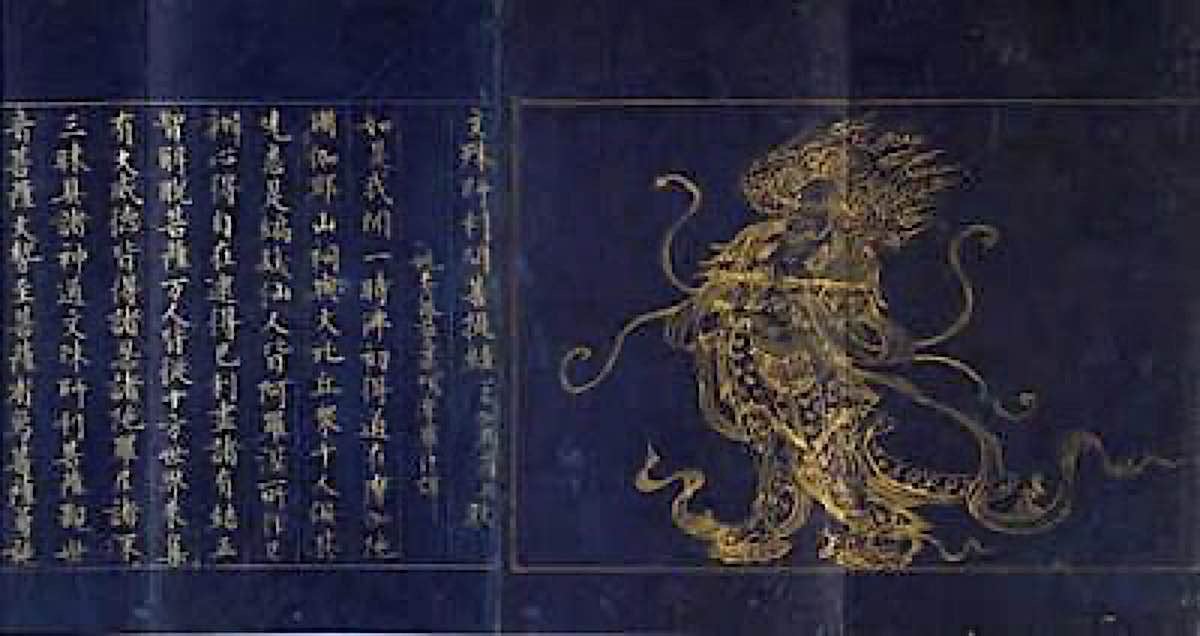The Essential Songs of Milarepa
CW32_No.87
Selected, Rhymed and Classified in a Practical Order
The Buddhist Yogi C. M. Chen [5]
I. Songs about Impermanence
1. Suffering of Birth
In the Bardo state the wanderer
Is the Alaya. It stays nowhere,
Driven by one’s own sorrow,
It enters a womb unknown.
Therein it feels like a fish,
Caught into crevice of rock,
Sleeping in blood red and pus yellow,
In all discharges it must pillow.
Crammed in filth, it suffers pain,
From bad karma one is to gain,
Though remembering past lives,
It cannot count four or five.
Now scorched by heat,
Now cold it does meet.
For nine months it remains,
In the womb with all pains,
From womb by pliers as if pulled out,
Head is squeez’d but safety is nought,
Like being thrown into a bramble,
When it bears all of a-tremble,
Its body on mother’s lap with sorrow,
It feels gripped by a hawk like a sparrow.
When his body blood and dirt is cleansed,
Like flayed alive its pains increas’d,
When umbilical cord is being cut,
It feels as if the spine does jut,
When wrapped in the cradle,
It feels bound by a girdle.
He who realizes not the truth of non-born
Never can escape from birth to be grown.
2. Suffering of Old-Age
When one’s body has been brought
To be frail and all worn out,
It dislikes old-age,
There is of this no doubt.
One’s straight body becomes bent,
Steps are not firm and patent.
Black hairs turn white, Arms have no might.
One’s eyes grow dim, Ears are not keen.
The head shakes, Pale are cheeks.
Blood becomes dry, One feels to die.
One’s nose will sink in,
Teeth can’t chew anything.
Losing control of tongue,
Sweet sugar isn’t fun.
One gathers food and wine,
But one can’t keep them fine.
Trying not to suffer anymore,
One only gets suffering in store.
When one is told the Truth,
But one’s faith is not growth,
Though one has some kinsmen,
They all his foes become.
Though he hears some teaching,
But nothing is changing,
Unless one realizes the Truth of non-decay,
He has to suffer old-age and not be gay.
3. Suffering of Sickness
Besides sickness old man has nothing to gain.
From three main kinds of illness one suffers pain.
The blood pressure does so increase,
Troubles of organs can not release,
In a safe easy bed, day and night,
The sick person feels no comfort nor might,
But toss’s about & groans in lament,
Through all the karma of defilement.
Though of some best food he eats,
All that he takes he vomits.
When you lay him in a cool place,
His heat still does not balance.
When you wrap him in some warm clothes,
He feels to an icy land close.
Though friends and kinsmen gather round,
No one sharing his pain can be found.
Though physicians are present at home,
No one can free him from harm.
He who learns not the truth of the sick,
For the holy Dharma he has to seek.
4. Suffering of Death
To repay the compound debts,
One must suffer by one’s death.
Yama’s guards catch the one,
Whose death-time comes so soon.
Rich cannot buy it off with gold,
Hero cannot cut it off with sword,
Neither can the clever woman outwit it by a strike
Nor can learned scholar refuse it by a teaching stick.
When all the big nerves converge,
One is crushed when two hills merge.
All visions become dim,
One remains with only sin.
Neither physician nor gurus can
Prolong the life of the dying man.
Gods and devas vanish into nought,
Breath has no inhalation but out.
One can but smell the dead flesh,
Like a lump of coal in ash.
When dying some still count the dates,
Others blubber about their bad fate,
Some think of losing their health,
Others of their remaining wealth,
One loves the dead no matter how long,
He can but let the dead be alone.
To throw him in water or in the fire to burn,
Or buried under land, the dead will not return.
He who realizes not the Truth of Death,
Should prepare the Western-travel wealth.
5. Eight Similes
When painting fades, where is the Padma (Lotus)?
This shows all things are like the Drama,
It proves their transient nature.
Think, then, you will practice Dharma.
The blue flower vanished fast
In the winter time of the frost.
It proves its transient nature.
Think, then, in Dharma you trust.
The flood sweeps down from the vale above,
When reaching plain it no more does rove.
It proves its transient nature.
Think, then, you will the Dharma love.
Did we not see the green rice grow?
Now their hull is in vale below.
It proves its transient nature.
Think, then, you will believe the Law.
And see the elegant silk cloth,
When a knife can cut it across,
It proves its transient nature.
Think, then, you learn of Bodhi-Class.
When you cherish the most rare gem,
Soon to others it will belong.
It proves its transient nature.
Think, then, to practice Dharma alone.
See the full moon so bright and round,
Few days later it will not be found.
It proves its transient nature.
Think, then to find the law profound.
Did you not here have a son born,
Who to final rest has long gone.
It proves the transient nature.
Think, then, you’ll practice very soon.
6. Six Realizations Facing Death
From extreme one is liberating
Like the gallant lion is lying,
In the snow at ease displaying.
Without fear of any kind of falling.
In this View I am so trusting.
To the final goal, death is so leading.
Joy to him who views thus, death brings
The very mild and genial big deer .
Horns having “many points in one taste mere”
He sleeps the plan of blessing near
In the practice do I trust so dear.
Death leads to the path of liberation,
Death brings joy to him who is practicing.
The fish occupies virtues ten,
With bright eyes in color golden,
Swims in the river of active ken,
In his action do I trust often.
Death leads to the Path of Liberation.
Death brings joy to him who is in action.
The Tigress of self-mind training,
With nice stripes she is adorning,
The altruism is her great glory.
In the woods she is straight walking.
I do trust in her discipline.
Death leads to the Path of Liberation.
Death brings joy to him who is training.
On the paper of forms positive and negative,
I write a long essay with my mind meditative.
In the state of non-duality
I watch myself and contemplate.
In such a Dharma do I trust.
Death leads me to liberate,
Death brings me the delight.
The purified essence of moving
Energy is like an eagle flying.
On its wings of skill and wisdom
To the holy cause of non-being.
To such attainment I am trusting.
Death leads me to the Liberation.
Death brings joy to meditation.
7. Yogi’s Realization against Death
Those who practice merely with mouth,
Talk much, seem to know more teachings,
When times come for passing away,
To the space are thrown their preachings.
When the clear light naturally shines,
It is cloaked by blindness of sin.
The chance to see the Dharmakaya,
At death is lost through one’s confusion.
Even though one spends his life
In learning holy scripture,
It helps not at the moment
When mind takes its departure.
And those yogis have not sufficient meditation
Mistake psychic light as sacred illumination,
Cannot unify the light of mother and of son,
They’re still in danger of rebirth in lower station.
When your body is rightly posed,
Mind absorbed in meditation,
You feel that here is no more mind,
Yet it’s only concentration.
Like starling fly unto the vast, empty sky,
Awareness as pure flower, bright lamp shining,
Though, it is void, transparent & vivid,
Yet it’s only a Dhyana feeling.
He who is with these good foundations
Penetrates Truth with contemplation,
And prays earnestly to the Three Gems
The non-ego wisdom he will win.
With the life rope of deep concentration
With the power of kindness & compassion,
With altruistic vow of Bodhi-heart,
He can directly get the clear vision,
The Truth of the Great Enlightened Path.
Nothing can be seen yet seen all things,
He sees how wrong were the fears and hopes,
All were in his own mind yet nothing.
He reaches the pure land without arrival,
Sees the Dharmakaya without seeing.
Without effort naturally sees all things,
Dear son, in your mind keep all my sayings.
8. On Bardo to Gampopa
The sentient beings are Samsara.
All are Buddhas in Nirvana.
In nature all are equal,
It’s Bardo-View, Gampopa!
The all manifesting red and white
Wonderful mind essence how to write.
All but a true non-dualistic state,
It is bardo practice, it’s quite right.
The myriad forms of illusion,
The self mind has no arising,
Both are in the innate-born-state.
This is the right Bardo-action.
The dream through habitual thought of last evening
And knowledge of non-entity of this morning,
They are the same in the light of Maya.
This is the Bardo when you are dreaming.
The five sorrows and the five Buddhas,
Identify in the two Karmas,
Glowing and perfecting in one-ness.
This is the path of Bardo-Dharma.
From the skill comes the Father-Tantra,
From wisdom comes the Mother-Tantra,
They unite in Third Initiation
Of the nature ’tis Bardo extra.
Self benefit is in Dharmakaya.
While other’s are in the other two kayas.
Primordially there is but only one
Not three, this is the Bardo Trikaya.
From the womb gate is born the impure body,
From pure form is born the pure Buddha body,
They are but one in the light of the Bardo.
This attainment of Bardo already.
II. Songs of Renunciation
9. Worldly Arbitrations
The advisor, mediator & go-between
These three persons always cause discord & pain.
The free man should be like mute taking no side
And on the silent mountain he should remain.
Property, kinsmen and native-land,
These three make one fall into Saha-realm.
One who would cross the river of sin,
Should cut off the long attachment-chain.
Self-conceit, pretense, and tricks,
These three make one’s falling quick.
He who would ascend upward,
Should keep his mind straightforward.
Scholarship, talk and discussion,
Derive from pride-causation.
He who would practice the Dharma
Should be humble and next to nothing.
Householder, work and career,
These three disturb Samadhi.
He who would gain the wisdom.
Should keep only his Bodhi.
Master, disciple, and learning,
These three may cause the more pride.
He who would like the Dharma
Should be humble and kiss the Rod.
Sorcery, magic and To Tze,
Draw a yogi to evil deeds.
He who would like the Dharma
Think of the sound of Jolmo birds.
10. Four Similes: To Rechungpa
Like white lion living on mountain
You should not go to the valley
Lest your nice mane become sullied.
To keep it in good order you should
Remain in snowy hill as you could.
Like great eagle flying above mountain
It never falls into a hole
Lest your wings be broken as a whole.
To keep it in good order you should
Remain in snowy mountain as you could.
Like the tigress passes the mountain
And stays only in deep forest
But on plain you’d have no rest.
To keep in good order you should
Remain in snowy hill as you could.
Like the nice and golden-eye’d fish
Swims only in the central sea,
Lest it let the fisherman to see.
To keep it in good order you should
Remain in snowy hill as you could.
11. Things Should Be Renounced
An action without meaning,
Fearless and empty talking,
And the profane pretention,
These three things reject the Lore.
I have renounced them before.
You should have these three no more.
The place that’s not fixed to pray,
The group that quarrels too much,
The status where hypocrites stay,
These three things reject the Lore.
I have renounced them before.
You should have these three no more.
The guru with tiny learning,
The pupil with poor devotion,
The friend who has no discipline,
These three things reject the Lore.
I have renounced them before.
You should have these three no more.
The wife who frequently complains,
The son who needs strike and blame,
The servant e’er needs more to explain,
These three things reject the Lore,
I have renounced them before.
You should have these three no more.
12. To Gampopa
When you think of delicious meal,
Eat the food of Samadhi Ideal,
Realize that all food is only delusion,
Hold to the Dharmakaya’s meditation.
When you think of your native land,
Dwell on the true home being at hand.
Realize that all places are only delusion,
Hold to the Dharmakaya meditation.
When you think of jewels and corn,
Compare them with the heavenly gems.
Realize that money is only delusion,
Hold to the Dharmakaya meditation.
When you think of some companions,
Take wisdom as your concubines.
Realize that all loves are delusions,
Hold to the Dharmakaya meditation.
13. To Rechungpa: Things Should be Renounced.
A son, a wife, and flame to extreme,
Are three great fetters for a yogi.
The practitioner should leave them.
Prestige, enjoyment and goods like gems,
Are three great hindrances to a yogi,
The practitioner should renounce them.
Relatives, disciples, and rich patrons,
Are three great obstacles to a yogi.
The practitioner should forsake them.
Fatigue, sleep, and spirits like gin,
Are three great robbers of a yogi.
The practitioner should forswear them.
To chat, to joke, to entertain,
Are three distractions to a yogi,
The practitioner should renounce them.
14. Refuses to Help Home Affairs
On the pasture of great blessing,
Immortal sheep I am herding.
I have no more time to watch
Animals of just blood and flesh.
I leave them, Lesebum, for you.
Like mother of love and blessing,
The wisdom child I am tending.
So I have no other learning
To tend the nose of your offspring.
I leave them, Lesebum, for you!
On the rock hill of non-moving
Stupa of mindfulness I’m making.
I have no time to manage
For you to mold those clay images.
I leave them, Lesebum, for you.
In the prayer room of my body
I am lighting my lamp of Bodhi.
I have no time to get a flagstaff
For hanging the print’d sutras thereof.
I leave them, Lesebum, for yourself.
In my Maya body,
I clean my thoughts untidy,
I have no time to give
To clean your room and cave.
I leave them all for you.
Among all the worlds form and way,
I am watching the Maya’s play.
I have no time to wash
Your bowl, cup, tray and dish.
I leave them all for you.
15. Six Deceptions
Temples are like stations for driftwood,
Divine life! Though priests have such mood,
But it is deceptive to me.
Therefore leave such companions I would.
(To talk and debate without meditation
Is like women’s quarrel and agitation.)
I’m a man who cherishes peace of mind,
Abhors all gossip and accusation.
(The above two lines in parentheses of the second quatrain are written by me as a supplement to the next two lines which were printed in the English translation as an incomplete quatrain. )
When Tomo is kindled within,
Woolen clothes are of nothing,
I have no need of the long robe,
All house works are disheartening.
When renunciation grows within,
All possessions are of nothing,
Of business I have no need,
All wealth to me has no meaning.
When perseverance grows within,
Son and disciples are of nothing,
I have no need of any meeting,
They would reduce my devotion.
When the pithy methods are working
Why would one need any preaching,
For it only incites one’s pride.
I’ve no need of books and learning.
16. Refuse the Offering of a Horse
My big horse is the mind prana,
It has a silk scarf of Dhyana.
Its spine is the true magic stage,
Its gem-saddle is the seat of sage.
Its crupper is the secret teaching,
My spurs are the three inspecting.
Head-stall is the life prana fine,
Forelock curl is shown as the three times,
Quiet within is its adornment,
Its rein shows boldly movement,
Bridle is the flowing allurement,
Gallops along the middle paththe spine.
This yogic horse, this stead of mind,
Riding it one escapes the world,
Reaches to Buddha Land the same kind.
I have no need of your black horse,
Go your way with any joy you find.
17. Refuse the Offering of a Boat
This land of blind view and darkness
Is part of three realms of heavens,
Full of thorns in craving meadow,
Full of mud is jealous morass,
Savage is the furious hatred,
While pride is the sloping steepness.
I have crossed the river four,
And reach the Buddha Pureland shore,
I’ve used the leather of Bodhi
And made my boat hidden no more.
I am a craftsman of deep faith,
Use the dye of non-lust for form
With thread and rope of devotion
And three bindings as the anchor.
Your boat I have no desire for,
Dear patron, please leave me and go.
18. Refuse the Offering of a Wife
The lust-free Sunyata is the woman,
Her compassionate face is so clement,
The deep loving kindness is in her smile,
Her dress is of red and white elements,
Uses non-discrimination as her girdle,
The non-duality as her ornament.
Her white necklace shows the many-in-one,
And the four blisses are her adornments.
She is such a beautiful Dakini.
Her real cause is the true accomplishment.
This is my lovely holy companion;
I have no interest in your woman.
19. Refuse the Offering of Temple
Unborn-mind is the Temple I dwell with,
Its top is the prana without moving.
I create the pillars of reality,
On the base of immutability.
The crescent symbolizes growing yoga,
While the great sun denotes perfect yoga,
On the ground of my warm meditation,
I draw an altar of observation.
All the lovely flowers in my garden
Are my practices of illumination.
Encircling the pagoda of Virtues
Is the ditch of Sunyata absorption.
This is my great yogic monastery,
Your worldly temple to me is of nothing.
20. Yogic Necessity
Because I fear the great rain,
I seek for house to remain in,
Sunyata is my good house,
I find joy where I maintain.
Because I fear the cold,
I seek for clothes to hold,
The inner fire is my dress,
I find warm enough and bold.
Because I fear being poor,
I seek money out of doors,
But find gems are within,
Myself is the donor.
Because I fear great hunger,
I seek for some food and beg,
Samadhi is a good food,
I feel hungry no longer.
Because I fear the thirst,
I seek for something to drink.
Mindfulness is a good wine,
I need nothing else to think.
Because I fear being lonesome,
I seek for a friend handsome.
The void-bliss is the best one,
I need no sweet friend to come.
Because I fear going astray,
I seek path which will not betray.
I find the short path is two-in-one,
I am not afraid to lose my way.
21. Yogic Possessions
The Alaya is my good earth,
The secret teaching is the seed,
Merits of Samadhi do sprout,
The Buddha is the fruit indeed.
These four are my holy formings,
Your worldly ones are deceiving.
You are only a slave laborer,
I discard it without thinking.
Sunyata is the warehouse,
Supramundane is the gem,
Virtues are the act and service,
From non-outflow one is to gain.
These four gems are property,
Your worldly ones are empty,
By magic spell you are cheated,
I dislike and discard it.
Buddha and Dakini are my parents,
The immaculate Dharma is my face,
The Sangha assembly is my kinsmen,
And protectors all are of the same race.
All these four are my holy family,
Your worldly kinsmen are not like my grace.
They all are deceitful and delusive,
Without hesitation I do displace.
The blissful brightness is my background,
The blissful passing is my father,
The two-in-one feeling is my skin,
The experiences are my shirt and garter.
All these four are my holy wives.
Your worldly companions are delusive,
They always are inclined to quarrel,
I leave them who are so aggressive.
The mindfulness is my new born baby,
Merits of Dhyana are my infants,
Comprehension is my lovely child
Law-keeper is my youth-like pendant,
These four are my holy good sons.
Your worldly offspring are of nothing,
They are deceitful and delusive,
Without delay I leave them as sin.
(Some additional songs of the above two classifications, Impermanence and Renunciation, were selected and translated by me and may be found in my booklet New No. 95, “Milarepa: His Personal Teaching of Renunciation “)
III. Songs About Precepts
22. Some Things Should Be Forbidden
Become a Buddha if you will,
Crave nothing, even a pill,
Lest you should fall into a trap,
And wander between good and evil.
To your Guru when you serve,
Don’t think you are the server,
He is the one who enjoys,
Or wishes will be fulfilled never.
When you observe the precept Tantric,
Don’t unite with those persons erotic,
Lest you should be influenced by evil,
And break all the precepts at any risk.
When you engage in study and learning,
Attach not mere words with proud feeling,
Else dormant fire of passion might blaze,
Your good thoughts and deeds be consuming.
When you practice with a friend,
Don’t keep many things at hand,
Lest your virtuous deeds will cease
And your devotion will end.
When you practice the path of form,
From the tradition of our home,
Don’t curse ghosts of any person
Lest you should be troubled by demons.
When you have got some experience
Don’t use power nor prophecy,
Lest your secret words should be lost
And lose all merits and mercy.
Commit not evil deeds,
Eat not beguiling foods,
Be not burdened by the dead,
Utter not the sweet words,
Always be humble and modest,
Thus reach the goal you would.
23. Fear Samsara and Keep Precepts
Alas! Is not Samsara like the sea,
Drawing as much water as one can see,
It remains the same without decreasing.
Are not the great Three Gems like Sumeru,
Can’t be shaken by pupils or Guru?
Is not Samaya like a feather?
No one cares if its sheds further,
Are not monks rules like lepers corpse?
Lying by road without concourse.
Is not badger’s skin laid over seats
Like thorns pricking the eminent priests?
Isn’t it true if people think of their guru
It is meaningless to lose their rules?
Isn’t it true that monks along the line
All ignore their good discipline?
Bandits intimate with yoga we have known,
Why should a yogi live in a town?
Most people crave for rebirth and Bardo,
Why cling to so many pupils they do.
Are woolen clothes in the next life so dear?
Why then those women do make so much here?
Do people fear the samsara being vacant?
Why then laymen and monks want more infants?
Are you keeping food for your next life,
Why then men do not like to give?
Is there any trouble in heaven above,
Why such a goal, men do not love?
Is that any job below in hell?
Why so many people like it so well?
Do you know that all suffering
In lower realms is due to sin,
Hence all merits you should practice,
When death comes you will have peace.
24. To Lesebum: How to Practice Without Mistakes.
To serve a Lama without compassion,
Is like worshiping one-eyed demon.
He and patron will get a lot of sin.
Practicing Dharma without Bodhi-heart
Is the selfish delusion of a fool,
It will intensify the greed and hate.
To give alms without equality,
Is like paying back for someone’s feast,
It will notify more hopes and desire.
To make offerings to the wrong person,
Is like giving to money-imposter.
It will bring more misery and poison.
To give charity without compassion,
Is like tying oneself to a pillar.
It will bind one tighter without rising.
Bearing a high view without practice,
Is like a swagger bragging about,
It will lose all one’s virtues and peace.
To meditate without knowing the way,
Is like conjuring a black magic horse,
The false win will soon be spent away.
Act in many ways without good Karma,
Is like mad man coming from a hot spring,
The more act the more apart from Dharma.
Live a luxurious life with desires,
Is like a nice silk dress but with stinking smell.
It will be blamed but not any one admire.
Attainment mix’d conceit and desire,
Is like the children’s toy made of clay.
It will soon be broken back into mire.
25. The Six Essential Precepts
He who though he’s mastered his semen
And gained the power of attraction,
If he relies on no Dakini
Should not practice love-meditation.
Such Karma mudra is dangerous,
Like climbing a hill’s culmination.
Unless he has great compassion
And a vivid Yidam of Tantra.
For the purpose of law and men,
Should not use the harmful Mantra.
Nor should he practice healing yoga,
Lest he be born as a ghost extra.
Even if he’s mastered the prana-mind,
If he can’t work through bodily power,
And has no full attainment of maya,
He should not bring a corpse in prayer
Lest he should provoke the bad Dakini
And get only trouble to himself forever.
Except to one’s own Vajra Brother
And qualified guru as Father,
One should not reveal one’s experience
To devotees of other parties
Lest he should lose all his great power
And get no power further.
Secret instructions you should not give
To those whose talent you observe,
Having or not permit from above.
But for the sake of one’s golden calf
To those who ask you blindly give,
Thus you’ll fall into sinful cave.
If one is unable to be converted,
One should not perform a homa
Or other tantric ritual
In town or village as a drama.
These should be performed only in Hermitage,
for it is a Secret Dharma.
26. Three Occasions for Miracles
To convert the impious person,
To get better meditation,
To identify the three Siddhis,
Except for these, there is no permission.
27. The Ten Difficulties
If a Buddhist be without benevolence
How can he convert beings as Reverence?
If spiritual longing he does not retain,
How can merits for sentient beings he attain?
If a great yogi has no perseverance,
How can he get attainment and experience.
If monks keep not the rules,
How can they be a Guru?
If a yogi violates Samaya,
How can he obtain the Trikaya?
If a Patron be lustful and mean,
How can he get good repute and win?
If a yogi talks nonsense,
How can he be the great Reverence?
If one acts with no virtue or good Karma,
He will never know the truth of Dharma.
If a trusted Lama becomes tired,
He will find it hard to be admired.
Though now you have faith to practice Dharma.
Later you regret if not good learner.
28. Forget Not What Should Be Done
Before faith and yearning arise for the law,
Begging alms for enjoyment is not allowed.
Before you have realized Primordial Truth,
Boast not of sublime philosophy or rules.
Before you have mastered the awareness,
Engaged not in the foolish acts of blindness.
Before you can be fed with sermons,
Be not involved in wicked occultism.
Before you can explain the teaching profound,
By patriarchal knowledge you shouldn’t be harmed.
Before you can increase your repute,
Other goodness you should not dispute.
Before you can destroy your craving within,
Trust not charity as if ’tis your right thing.
Before you can stop habitual thought,
Guess not when your prediction is sought.
Before you have gained supreme attainment,
Assume not you are a venerable Saint.
Before you can master all practices and rules,
Consider not you may now leave your Guru.
29. How to Get Sufficient Cause for Accomplishment
If there be neither karma nor condition held,
In this life one would not obtain the Buddhahood.
He who cannot put all trust in his teacher,
Should not expect care & blessings in future.
He who cannot satisfy his students,
Should not expect to get good attendants.
He who cannot master his own mind,
No hope to lead others could he find.
He who cannot hold the lineage tradition,
There is no hope to get the realization.
He who does not practice with great diligence,
No hope to get the Buddha-like reverence.
He who has not cut the bonds of duality,
Can’t expect great compassion and reality.
He who reveres not the chain of clinging,
Should not expect an all-free-view teaching.
He who has not seen self-mind in nakedness,
Cannot behold the true nature in brightness.
He who does not cleanse the evil purulence
Should not expect the unceasing experience.
He who destroys not the attachment, hence,
Expects not relaxation of the six sense.
He who is not skilled in the voidness Samadhi,
Cannot get the real omnipresence of Bodhi.
He whose subtle sorrows still maintain,
Has no trikaya to obtain.
He whose moral rules have not been observed,
Immediate happiness will not deserve.
He whose two Sambharas have not been held.
Should not expect to obtain Buddhahood.
He who obeys not the guru father,
Shouldn’t expect to guide all the brothers.
He whose awareness has not been mastered fine,
Should not expect the freedom from ghost divine.
All appearance he cannot master and win,
Should not expect to govern those three realms.
He who has not transcended the mundane level,
Should not cherish the “no good & no evil.”
The yogi who a temple is leading
Should not neglect rules & discipline.
Knowing not the stages of experience principle,
Should not try to check those practice of disciple.
Without fulfilling practice of the instruction,
Can’t expect in Bardo to gain Liberation.
If precepts have not been observed in perfect form,
One’s wishes will never be easily performed.
He whose samaya rules have not been well observed,
Protection by Bho Wa, Bho Mo is not deserved.
He who obtains not the essence of holy scripture,
Should not neglect the words and the symbol nature.
If one has no five powers so fine,
Should not be proud of external signs.
If real experience one’s not able to find,
He shouldn’t neglect to control his mind.
IV. Songs about Paramitas
30. Six Paramitas: To Lodum.
Wealth is but a cause of diversion.
He who can give all his wealth away,
A prince of Heaven will be and stay.
Noble is he to practice such teaching
Precepts which lead to the liberation.
He who does keep all the disciplines
To lower state will never be falling.
Noble is he to follow the great teaching,
Patience is so good a Virtue.
Buddha cherishes it very much,
It is like armor of a soldier.
All merits grown, no demons touch,
Diligence makes the great path short,
Without it nothing can be done,
He who, day and night keeps it on,
He is riding a horse to start.
Meditation is between two,
Deep wisdom & Merit too.
All distractions can overcome
Without practice it is who?
Wisdom approach to the reality
A treasure of Buddha & deity.
He enjoys it without exhaustion
Fulfills all wishes in his exertion.
V. Songs about Meditation & Mahamudra
31. Exhortation about the Mind
Great is the skillful Tantric path,
And the gurus pithy Instructions,
Constancy and resolution.
These three are most important things.
Keep life prana at the key point,
Mind-essence in natural state,
Let all thoughts under self control.
These three are the entering gate.
Fulfill the precepts of Guru,
Obtain the heart wishes of achievement,
And self sacrifice without effort.
These three are the great accomplishment.
Outer demons and hindrance disappear,
Inner desires and lust are no more,
No disorder or ill of body
These three absences one should adore.
The skill & renounce in speech,
And that of my eloquence,
Knowledge of nature and mind,
These three are mine proficient.
Clearly I see bliss is void of substance,
Clearly I see things without difference,
Clearly I see them appear beyond words.
These three are the sights of experience.
When there is the Dharma meeting,
Means and joy are too gathering,
And all Dakinis congregate.
These three are the holy assembly.
These twenty-one mental exhortations
Are consequence of my meditation.
All Dharma seekers should respect them,
My followers should pay more attention.
32. How to Settle Your Mind
How to settle your own mind at rest,
The secret lies in letting go,
Making no strain, doing nothing,
Like sleeping child you should do so.
Like calm ocean without waves,
Like a brilliant lamp without wind,
Rest your mind in peace.
Like corpse without pride,
Rest it steadfastly.
Like sea without tide,
Free from any kind of grind.
Do you know how thought arises?
Like dream is without substance,
Like the vast sunless heaven,
Moons seen in outer distance,
Like the rainbow of maya,
We could not find certain source.
When the light of wisdom shines,
They disappear, no more trace.
Do you know how to cope with thoughts?
Try to see the versatile clouds,
Yet from sky they are not apart,
Try to see the waves of the sea,
Yet from sea they are not apart.
Try to see the heavy thick fog,
Yet from air it is not apart.
Thus the frantic runs in nature.
Yet from nature it is not apart.
He who can weigh the awareness,
Will know mind is rising in breath.
He who seeks sneaking thoughts like thieves,
Will know to watch this subtle mischief.
He who finds the thought running outside,
Knows the simile of dove and boat in tide.
Do you know how to act and comprehend?
Like a bold lion, a drunken elephant,
Shadow in mirror and lotus in mud?
Thus you may act the same yet different.
Do you know how to get the attainment,
Dharmakaya gained in non-discernment,
Sambhogakaya through the blissfulness,
Nirmanakayaone ray of Enlightenment,
Sahajakaya through the innateness.
Of these four ones I have the achievement.
33. Instructions of Meditation
Realizing not the Truth of many-in-one,
If you are meditating in the great light,
You have only kept the cling-view on.
Realizing not the unity of void and bliss,
Even though you may meditate on void,
You could only practice like the nihilist.
If you can’t keep meditation
At anywhere and in any time
You are still in delusion.
If you realize not the plain-mind,
Your practice is not of non-duality,
And non-effort you will not find.
Knowing not that self mind has no existence,
Even if you practice non-discernment,
Your effort is still not in transcendence.
If your renunciation could not be found,
Your actionless-state of meditation
By the worldly hopes & fears is still bound.
Knowing not how to refuse & hold,
All doing surely will enmesh
In the toils & moils of the world.
34. Advising Rechungpa To Train His Mind
Hard horn & solid wood
Can be bound if one tries,
But the harsh mind in mood
Hard to bind even you would.
Tiger in south, yak in north
Can be tamed if you tried,
But pride of mind and mouth
Hard to tame even non-sloth.
Hills & ricks, here and there,
Both may meet without care.
But the foe of mind
Hard to know, comes from where.
Queens & kings, laws & cause,
Can be avoided if you tried,
But no one can evade
Yama the Lord of Death.
Mice in hole, bird in sky
Can he catch by and by.
Hard is to catch the mind
And its fault e’en you try.
The Dharma to speculate
May be done and ne’er late,
But the self-mind to be void,
Must try to meditate.
Our father & mother
May be left if one tried,
Evil is hard to leave,
How change with fine feather?
Jewels and house and ground,
May be renounced if one tried,
But the craving of pleasure
Is hard to be voided.
Even a lovely sweet-heart
May be left if one tried
But to leave soft warm bed,
It is very, very hard.
35. Somethings Should be Forbidden When One is Practicing Meditation
When in the realm that is beyond,
Do not let the playwords appear,
Lest you should become very proud,
It is good to let your mind be clear.
When self liberation happens,
Engage not in speculation,
Lest meaningless acts be fallen,
You have to keep meditation.
When you hold to the void nature,
Think of not many from the one,
Lest you have to fall in future,
Rest it at ease and keep it on.
When mahamudra in practicing,
You should leave the virtuous deed & speech,
Lest your wisdom should increase nothing,
Rest in non-act-state as our Teacher.
When revelation is disclosed,
Don’t be conceited or overjoyed,
Care of the wolf in sheep’s clothing,
Rest in non-act-state as a boy.
When mind unites with conditions,
Stir not worldly attachment,
Lest you should lose meditation
Rest in the state of non-movement.
36. Daily Life Meditation; To Rechungpa
Your old father sometimes sleeps
But in sleeping he still keeps
The sleep light in the darkness.
May you all share the brightness.
Your old father sometimes eats,
Him, there is no food to cheat.
Uses the food as the Homa,
Practices are all in Dharma.
Your old father sometimes walks,
At Truth in all steps he looks,
Thought there is only space found,
But all Buddhas he circles round.
37. To Dhampa Sanji, Relieving All Sorrows
When demons come to harm you,
Be aware, it is the time
To apply your power prime.
When pain & sickness harm you,
Be aware, it is the time
To keep your heart in good rhyme.
Whenever delusion rises,
Be aware, it is the time,
Transmute it to the sublime.
When lying in a place alone,
Be aware, it is the good time
To rest in your natural quiet clime.
When mingling with many people,
Be aware, it is the good time
To bring all to the stage prime.
When you come to drowsiness,
Be aware, it is the time,
Utter a PAI to this crime.
When any kind thought disturbs you,
Be aware, it is the time,
To lead it to the sublime.
When mind runs after anything,
Be aware, it is the time
To observe the suchness kind.
This teaching of relieving sorrows
Turns all opponents to good fellow;
Whatever thought rises, you feel but joy,
Whatever ill comes, you can employ.
Whatever encounters make you feel gay,
Whenever death comes, you go best way.
This teaching makes all sorrows relieved,
By Dorjechang this law is to give.
It is Dakini’s life & heart,
It is essence of fourth tantric part.
It is the pith of the whispered school,
It is the key to essential rules.
38. Mahamudra Instruction
I the Buddhist yogi see the essence
By just gazing nakedly upon it.
I see it beyond play words as the sky,
By letting it go, I see the reality.
I realize the voidness nature of things,
By resting at ease in its entirety,
I relax, relax & come to the nature,
I let go, let go, come to purity.
39. Four Key Points of Mahamudra
Manifestation is the mind,
Mind is the entity of light,
Light is without any conception,
These are the key-points of the view bright.
Delusion is the Dharmakaya,
Awareness is the bright Tathata,
In which there is no need of acting.
This is the main practical data.
In nature there is no good to do,
Nor is there any evil to forbid,
The void entity ne’er be disturbed,
Such action is very good indeed.
There is no samsara to renounce,
Nor is Nirvana to attain,
Just know yourself as the real Truth,
It is the consequence you will gain.
40. Four Yogas of the Mahamudra
To cling is the cause of Samsara,
To realize non-clinging is Nirvana,
Which is the stage of perfect unborn.
This is one main point of Mahamudra.
Talks about two-in-one but seats on non-form,
Talks about karma but commits no good,
He is meditating on the blindness,
In the true one-point there is no such mood,
Realize non-clinging of the Vidya.
In the natural bliss without playwords
One sees the sign as clear as the sky,
He would never be cheated afterwards.
Talks about non-playwords,
He still puts words on words,
He sits with self-clinging,
But there is no such records.
Form and nature have no difference,
Samsara, nirvana are the same,
Buddha and men are in the one-ness,
Sign of one-taste not mere names.
Talks about that all-in-one
He is still in duality.
But in the stage of one-taste
There is no such duality.
Thought itself is the essence of wisdom,
Cause and effect both in the same kingdom,
Trikaya are within one’s own body,
This is the non-practice one should go on.
Talks about the stage of non-practice,
His mind is in the activity.
He is still in the realm of darkness,
But this stage is in bright reality.
41. View, Practice, Action and Consequence of the Mahamudra
Because I see the real face of the view,
All the contrasting thoughts are dissolved,
Hence I’ve no two kinds of ideas of old or new,
The right view is void of others and self.
When the practice is based on the one-point,
There’s no nuance between evil and good.
I have no two kinds of feeling joy or pain,
The practice is void of feeling and mood.
When I adhere to natural action,
Like or dislike have no difference.
I have neither craving nor hatred,
The action is free from reference.
As the consequence is of nature,
Nirvana and Samsara are one.
I have neither getting nor losing;
The result has nothing to be done.
42. Missings of View, Practice, Action and Consequence
The view is the wisdom of voidness,
The practice is the light of non-clinging,
The act is the holy play without lust,
The fruit is nude of immaculation.
Don’t miss the view through words and thoughts,
Words alone can never be free from ego,
The true knowledge should be gained within,
To strive for the true one you should go.
Don’t miss the practice by mere Dhyana,
Concentration can’t lead to the freedom,
Your wisdom should shine out within yourself,
You should work hard in the mental kingdom.
Don’t miss the action by your idle talk,
You should be disgusted by worldly desire,
They differ from the Tantric method,
Unless you make them as aid, admired.
Don’t miss the nude fruit by ignorance,
When your delusive thought appears,
Hard efforts bring only little result,
You should strive for the true experience.
43. Errors in the View, Practice, Action and Consequence
When you deepen the view profound,
Be not misled by the knowledge,
Chatter not about the voidness,
Before you have awareness found.
Though all things manifest as an echo,
Yet they have their certain correspondence,
Virtuous Karma should ne’er be neglected,
Neither you should hold to them with ego.
Revile not others with bigotry,
Cling not to yourself fixed idea,
First realize the true self nature,
Then root up all the errors here.
Before the great light shines forth,
Cling not to the joy and voidness,
Though you know all things are empty,
Ne’er wallow in the happiness.
Things themselves are empty,
To which one should not grasp,
Lest you stray in haveness,
Which shuts the void with clasp.
When one gets some worldly bliss,
One’s thought will hold it and stay,
Attached to such an ecstasy,
He is troubled and goes astray.
Before realization shines holy bliss,
And five sense get their special experiences,
Engage not in anomalous methods,
Lest you go astray out of ordinance.
Besides the attainment of saving beings,
One should not seek Buddhahood elsewhere,
Before the essence of self-mind is seen,
Take care of falling into hope and fear.
Should you think of your body like Buddha,
Ne’er deem it as that of Nirvana,
Should your thoughts vanish out in reality,
But never treat it as well as entity.
The great merits and Pure Land
Are manifested by wisdom,
Never should one regard them
As things in the Saha kingdom.
44. Subdue the Vinayoga
The snow lions paws are never frozen,
If frozen, of what is it called King.
He who has the three perfect powers
Among all the beasts, he is the best being.
The eagle never falls down from the sky,
If so, would not it be absurd and shy,
As iron block cannot be cracked.
If so diamond may be broken.
Should one fear demons and evils,
If so what is the Bodhi-wills,
The foes of the right Dharmademons,
I really have pleasure to welcome.
And pray you to stay here for a night long,
Listen my sermon you would not be gone.
45. The Six Similes of Meditation
If there be obstacles, it is not space,
If there be numbers, it is not stars,
If there is a deep mountain
Without shake it should maintain.
If there is the great ocean,
No different drops should be mentioned.
If one needs a bridge to pass,
Not a true swimmer he is,
If it is a rainbow,
To grasp it, who and how?
VI. Songs about Vajra Love
46. Answer to Dakini Tzerima
I have mastered energy and mind,
May accept the mudra of your kind.
‘Tis true, among many offerings,
Most fruitful is mudra we could find.
Your face and lotus is full of bliss,
Shell shaped nadi speeds the ecstasy,
Protective mark is in your recess,
Through elephant get true fantasy.
You are the noble body of longevity,
BHAM and E shapes are in your lotus secret,
And in my Dorje there is a Bija HUM,
When combined with PAD as the semen great,
Wisdom & merit both joined together.
The Bliss of two-in-one thus dictates
The four blisses and four moments are
The essence of the four Buddhakaya.
Like the crawling of a tortoise,
Should drop down slowly without loss,
Then hold it in the channel central
Like the camel with water control.
When you spread all bliss in your body,
The liberating mudra is ready:
TIA is the bliss of equality,
LE is Nirvana of reality.
LA means the various coitus actions,
KYI is the twist bliss meditation,
PHYAG is the intercourse this and that,
RGYA, Nirvana & samsara unite.
LA is to contact this & act on that,
KYI is do this & that & associate.
PHYAG is the union of voidness & bliss,
RGYA is the one beyond which nothing could pass.
This is the most speedy path of union
Which is blissful in both companions.
Enable us to quickly be enlightened
In illumination of wisdom,
Leading to the great Dharmakaya,
Obtaining great Sambhogakaya,
Manifesting Nirmanakaya.
This is a path of bliss and voidness
Of no thought, of no duality.
This is a path of assistance
By the Dakini to the reality.
Following this good inspiring way
Four Ladies you will in freedom stay,
And remain in the realm of non-born
Oh! Fairies you are always welcome.
47. To Dharma Bodhi
When the five mothers of five wonderful nerves
Meet the father of five pure energies,
The five sons of pure elements are born,
The five purities of true nature come.
In middle nerve of palace beyond,
The victory Buddha with great pleasure
Shouts to the wombs of the four rainbow chakras,
Gives the order of non-grasp non-pressure.
By realizing all forms are the truth,
I have held the mind as my wife’s face,
So none of sentient beings of the world
Are apart from embrace of true race.
This is my companion the Bodhi-heart,
Happy is this consort, never depart.
VII. Songs about Recapitulation
48. Six Gatherings
Pious people are gathered in day time,
Lovely Dakinis come at night.
In morning tonic foods are brought,
Evening dress need not be sought,
In my soul turns Bodhi wheel,
might Outer world and my mind unite.
49. Six Goodness
Good is the view of Mahamudra,
Good is the practice of six yoga,
Good is the profound love-vajra,
Good is the last aim of Trikaya,
Good is the deep grace of Kagyupa,
Good are the instructions of Marpa.
50. Six Guides
He dispels the dark and saves the blind,
The accomplished guru is the guide.
For fearing, craving, no clothes to hide,
Free from both cold and warm is the guide.
To grasp the darkness of Bardo of the blind,
The yogic transformation is the great guide.
To show the great path through all Buddhist lands,
The master of prana-mind is the guide.
Offering one’s body like words elide,
The teaching of non-ego is the guide.
The meditator who is in cave to hide,
Leads himself to enlightenment is the guide.
51. Good Companions
The Dakini, Buddha & Guru
Are the three for prayer in good rule.
Buddha, Dharma & Sangha three
Are the refuges like a great tree.
The Sutra, Tantra & Sastra,
Are the three to which you should trust.
Prana, Bindu & all Nadis
Are the three for tantric practice.
Bliss, Illumination & Non-thought
Are three for meditation should be taught.
Piety, Pure Thought & Compassion
Are of Bodhi-path these three things.
Bha Wa, Bho Mo & the Guards,
To safety these are three guides,
(Bha Wa is protective hero, Bho Mo, heroine.)
52. Nobilities in Similes
Sitting on sun & moon, my gurus
Of the succession are on my head.
They are like a string of dear jewels.
My mind has been blessed & so glad.
The three great precious gems
E’er protect me and help,
I am like their baby
Fed on his mother’s lap.
On my right are the Heroes
Who dispel all my hindrance,
Like shades covering my head
They are my trusted reliance.
On my left are the Heroines
Who bless me with great two Siddhis,
They are mother & sister,
Embrace me like pagoda.
Before me are the powerful guards
Who carry out all my orders,
They are like obedient servants
Often with me like my shadow.
My view on truth is the great perfection
With which I enlarge the Hinayana.
It is like bold lion strutting in snow
Fearless as I in the Vajrayana.
My practice of wisdom and skill
Is like the great eagle’s mighty wings
With which I rear into heaven
Without any fear or any falling.
My action is full of strength & valor,
There’s no more distraction or drowsiness.
It is like a Tiger stalking in mood,
Bold is he without dread or fearfulness.
Having obtained the Trikaya,
I save all beings with transformation,
Like a golden fish that plays with glee
In water he has no need of exertion.
I am the yogi Milarepa,
who From one retreat wanders to another,
I am like the wild beasts who live
In the mountains without flutter.
53. Every Man Needs Dharma
Superior men need Dharma,
Without it they are like eagles,
Even though perched on high
They have no meaning but wriggle.
Average men have need of Dharma,
Without it they are like Tiger,
Though possessing great power
They are of the earthly eager.
Inferior men need Dharma,
Without it they are like asses,
Though they can carry a big load
But no keen wisdom they possess.
Superior women need Dharma,
Without it like pictures on wall,
Though they could look so pretty
But no use neither great nor small.
Average women need Dharma,
Without it they are like the mouse,
They are clever to get good food,
But only a little thing in mouth.
Inferior women need Dharma,
Without it they are like vixens,
Though they are so deft and cunning
They have no value to listen.
Old men have need of Dharma,
Without it they are like old tree,
All youth have need of Dharma,
Without it like bull not free.
Young maidens need of Dharma,
Without it like the nice cows.
All young people need Dharma,
Without it like shutting flowers.
All children have need of Dharma,
Without it they will meet Demon.
Everyone has need of Dharma,
Without it no fruit or blossom.
Those who want to live with meaning
Should practice the Buddhas teaching.
54. How to Gain Happiness & Avoid Suffering
He who knows his own nature imminent
Is ever glad.
He who knows not the truth & wrongly acts
Is ever sad.
He who is pure & in the nature rests
Is ever glad.
He who’s impulsed by objects & lust subjects
Is ever sad.
He who knows all things are the Dharmakaya,
Free from fear, hope & doubts, is ever glad.
He who is impatient, talkative & rash,
Being cheated by worldly desire, is ever sad.
He who knows all things are his mind,
Meets whoever is friendly is ever glad.
He who squanders his life away,
Buried in remorse is ever sad,
He who has a perfect realization,
At ease, in self-proved truth is ever glad.
He who is enslaved by endless desires,
And is always longing is ever sad.
He who is freed from all forms and effort,
And full of experience is ever glad.
He who merely follows symbols and words,
And never reflects his mind is ever sad.
He who renounces all worldly things,
Free from worry is ever glad.
He who stores up grain and cherishes
The women and kinsmen is ever sad.
He who discards all those worldly ties,
Knowing all is magic, is ever glad.
He who sensualizes his body and mind,
Often diverting himself is ever sad.
He who rides the horse of diligence
To the freedom land is ever glad.
He who swears to practice the Dharma
But still has sinful deeds is ever sad.
He who leaves all this and that behind
Practices pure Dharma is ever glad.
(He who gets all this and that ahead
And practices bad karma is ever sad.)
(The last two sentences were left out by the English translator.)
55. The Conditions of Disciple to be Accepted
If faith rises from your heart
And you take no heed of worldly gain,
If you really want to follow me,
Cut off the hinderance of kinsmen.
Think that they are devils,
Quench your craving for them,
Money and food are the devil’s envoys,
To unite with them is pernicious.
They are still objects to hinder you,
You must renounce them & all other things,
Delight in pleasure is the devil’s rope,
Cut off all desires is my only hope.
Your partner is the devil’s tempting net,
Watching the delusion you should not let.
Native land is the devil’s dungeon,
Falling in there is no religion.
To escape and strive for the Dharma,
Take the instant action you try,
then In time your body of illusion will decay.
‘Tis better to practice Dharma without delay.
Darting birds of mind will fly up anyway.
‘Tis better to the Pure Land wing your way.
If you believe and follow what I have said,
A worthy Dharma vessel you are so made,
All pithy instructions & profound teaching
Will be imparted and benediction be laid.
My son! This is the start
Of course on the Bodhi-way,
You should be glad to go,
I’m also very gay!
56. Guides
Samadhi is the guide to know
The mind nature is like the sky,
Who realizes one’s body is the Temple
Knows the path & will not be shy.
The steady faith is the guide to know
Mundane and un-mundane are one,
And that the four Buddha bodies
Exist in merely one’s mind own.
Non-clinging to objects is the guide,
Six senses turn all hindrance into helpness.
Hence one should be free from all dualities
And reach the other shore of happiness.
The upright Acarya is the guide
Who clears away your doubts and clearly.
One should serve his Guru as Buddha,
Happy is he holding mind freely.
This cotton clothing is the guide
That protects me in snowy mountain.
Better to lie naked in snow
Neither heat nor cold to retain.
Identifying and transforming
And Unities, all three are the guide
That can crush all fears of Bardo,
Life and death are freed from both sides.
The path of the whispered is the guide,
Distinguishes the legal from the illegal.
Ones life prana goes to the central nerve
Hence his mind and body have been settled well.
Voidness and Compassion are the guide,
One cuts off the jargon and play words.
Surrounded by many enlightened beings,
He will win more disciples afterwards.
57. Practical Times
When lying down in the bed,
let Your mind unite with Avidya not.
Recite mantra at evening,
Pray to the holy one at night.
At midnight meditate on Truth.
When day breaks, prana to practice.
Repent of evils in the moon.
When sun rises unite mind with forms.
58. The Most Important Things to Know
It is most important to know
The rainbow-like Buddha body
Is void yet appears then & now.
It is most important to find
The devils have no existence,
They are magic form of your mind.
It is most important a rule
Pay your respects to the one
Who is the gracious Guru.
It is most important to fear
The endless & useless worldly
Affair which should be renounced here.
It is most important to notice
The great Tomo & blissful hard work
Which is in the pure prana practice.
It is most important to unite
Dream yoga with illusory body,
And practice them in day time & night.
It is most important to awake
On the Dhyana of great symbol
For the enlightened essence sake.
It is most important to care
The instruction of “cutting through”
For the manifesting affair.
It is very important thing
To have the pity & voidness
Toward the unawakened being.
It is important to be freed
From many of those hopes & fears.
It is the Dharmakaya creed.
VIII. Songs about Realization
59. The Joys
My body is the holy mandala
Wherein resides the Buddhas of all times,
I offer all need & attachment,
Happy am I without material crime.
All beings are latent Buddhas,
All realms are self- created palace,
Whate’er I do is a play
Of this Dharmakaya race,
Wherever I stay is Pure Land
Which is Buddha’s holy place,
Whomever I’m with are divines,
I see them to interlace.
With wisdom I am happy
To go outside to solace.
On the paper of red & white forces
I use the ink of the true wisdom
To write the words & signs of five senses
Then become the Dharmakaya, the forms
Happy and foolish book can’t harm.
All sentient beings in Samsara
Have “thatness” but realize it not,
Set in Samadhi of Trikaya
Happy am I who feels death is nought.
60. To Bodhi-Dharma
Five twisted nadis are straightened by prana practice,
Five moving pranas are straightened in taming peace,
Five sullied elements are burned out,
Wind in the central nerve become nought,
No errant thoughts, no necessity for me
To entangle my self with whate’er may be.
61. Merit of Milarepa Shown Rechungpa
Sun & Moon on the tip of my ears
Shines as radiant rainbow & reveal here,
This union of wisdom & merit;
This proves my steadfast right reality.
Look, it is like watching the play goats,
How it compares with worldly records.
The five color rays from my nostrils
Stream like many jeweled threads,
They are the essence of marvel sounds,
Show my mastery prana profound
Through the Vajra reciting yoga;
It proves that my life force is prolonged.
A red lotus opens in my mouth,
Consonant & vowels are to touch,
They go round & shine without limit,
They are the symbol of vajra teaching,
Beholding them with many earnest eyes;
Realize all Dharma is my speech.
Look, it is like watching the play goats,
How can it compare with worldly records
From the center my heart streams,
Glowing many holy bright beams,
This shows immutable Trikaya;
Void & mercy both are in dream.
Look! It is like watching the play goats,
How can it compare with worldly records!
62. Bodily Altar
In secret wheel dwells Dorje Dangi
With his retinue, Favor me bliss,
Embrace Buddhas innate wisdom
Where joy & void unite through breath.
In navel wheel there is Dem Chog
With his retinue, Give me joy,
There sixty-two gods encircle him,
May my vajra body be like boy.
The dharma wheel is in my heart,
Dwells Jedor and his nine deities,
There’s the essence of three sattvas,
Vajra mind is the entity
(Under the “three sattvas” in the English translation there is a question mark which may be answered by the below:
Samaya SattvaBody,
Prajna SattvaHeart,
Samadhi SattvaThe Top of the Bija.)
Between eyebrows there’s the white conch chakra,
Dwells Buddha Yatama & some deities,
Is the symbol of wisdom & merit,
This is the real chakra of unity.
The great bliss chakra is in my head,
Dwell Sunwongduba & many gods,
Nadis & bindus are united here,
A chakra full of Bliss such as ne’er had.
Son! If you can unite with these Buddhas,
Your own Buddha body will surely appear,
Your flesh one will become rainbow one,
Such marvel you should have faith on and hear.
63. Instruction to Rechungpa
Ph! Son, one’s body suffices as temple,
For the wisdom drop is the mandala sample.
One’s own mind suffices as the great guru,
All true knowledge comes from it as a rule.
All other things suffice as the sutras,
They are symbols of truth nothing betrays.
Food of Samadhi suffices for living,
In which all Buddhas come for and blessing.
The Tomo heat suffices for clothes,
The Dakini gives you the blissful dress.
To cut off all ties is the best consort,
To live alone is a friend of duty.
To treat foes as guest is to rid hatred.
To treat hindrance as void is not so bad.
They all are magic like plays of the mind,
This is the only right way you could find.
64. Sermon to Rechungpa
When compassion arises in my heart,
I feel all beings in the three realms
Where they’re enslaved in fire so hot.
When the teachings are kept in my mind,
As the salt dissolves in water,
I got absorption of a good kind.
When the wisdom shines its light within,
I feel as awakened from a dream,
I can free from yes or no ideation.
When one gets the bliss from the view right,
He feels that each thing is free itself,
Most dissolve into act, all is white.
When one comes to essence of being,
He finds the wisdom of reality
Like cloudless sky is illumining.
When pure & impure thoughts both cleared,
He finds it is like silver mirror,
The imminent bright wisdom appears.
When Alaya Dharmakaya becomes,
I feel my flesh & soul both break forth,
Like the crushing egg when stamped upon.
When one cuts off the rope of clinging,
The existence of Bardo disappears,
like the long serpent without coiling.
When I act without getting or losing,
My mind is at ease I’m like a lion
With the power of three perfections,
Voidness, wisdom & manifestation.
These three all are in illumination.
They are my three inseparable dear friends,
Like the sun shining its rays without end,
Like dividing the horse from its yoke,
The string of mind & sadness cutting,
Inner & Outer distinctions are broke,
And my attainment is completed. f
|
